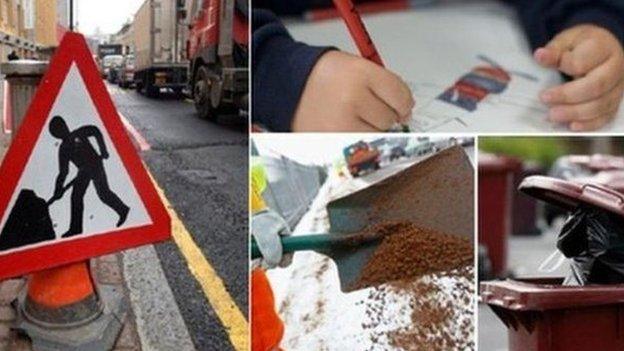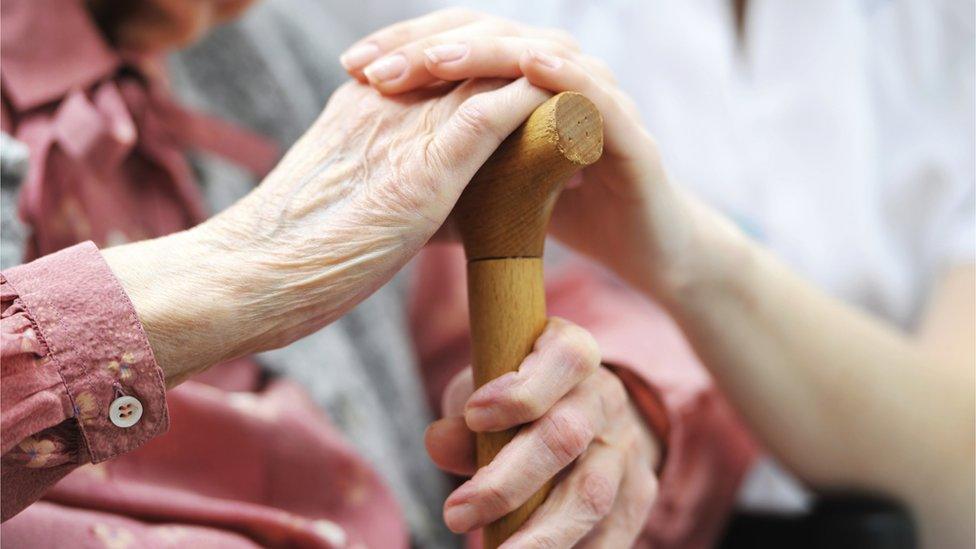Councils hit out at 'draconian' moves
- Published

Cosla claims councils are facing a combined £350m of cuts to their budgets this year
The Scottish government is taking fresh steps to try to stop local authorities breaking the council tax freeze.
The government has given councils details of the sanctions they would face if they broke ranks and raised the tax for the first time since 2007.
Local government organisation Cosla said councils would now face "draconian" measures.
It said it was now hard to see how Scotland's 32 local authorities could afford to put up council tax bills.
Further details of the offer being made to councils are still emerging.
But BBC Scotland understands it includes a bigger than usual stick to stop any council putting up the council tax.
BBC Scotland believes that any council which rejected the funding deal would lose money on three counts.
their share of money for freezing the council tax
their share of £250m towards the integration of health and social care
their share of money to maintain the ratio of teachers to pupils in schools
The three together are worth more than £408m to Scotland's councils.
The local authorities had been working on the assumption that if they put up council tax, they would lose the money they would have got for freezing it - but not lost any other revenue.
The latest arrangements may mean that Moray's proposed 18% council tax rise may no longer be a practical option.
The council may now need to either abandon the idea or propose an even bigger increase.

The funding deal includes £250m for council social care services
Cosla president Councillor David O'Neill said; "Outrageous as it seems the effect of this draconian sanction regime is that any choice to put up council tax is now denied to any council.
"The sanction is so punitive that it is difficult to see how any council could run the risk of falling foul of it.
"For that reason it may well be that no council increases the council tax."
He added: "Make no mistake this is not a matter of choice for councils and this may be perceived as victory for Finance Secretary John Swinney but it is certainly not a victory for communities or democracy."
The deadline for councils to accept the funding deal has been extended to 2 February.
Councils were originally mean to tell the government what they were doing by 2 January.
'Pressures on budgets'
Following an earlier meeting with council representatives, Mr Swinney said: "I am absolutely committed to continuing a positive, collaborative relationship with Scotland's local authorities, and I have engaged in open discussions with Cosla on what is a challenging but fair settlement for local government in Scotland.
"This settlement is an opportunity to transform the provision of social care in Scotland with a £250m investment in integrating health and social care services - helping to make our services fit for the challenges of the 21st century.
"We recognise that there are pressures on budgets being felt across the whole of the public sector, as well as in households throughout Scotland. That's why it is important to maintain the Council Tax freeze while we consider ways to replace it - as well as reimbursing local authorities to ensure they can continue to provide essential services."
He added: "The funding proposals I have set out for local government will protect our shared priorities and deliver practical financial support to increase the pace of reform and improve public services - I would urge councils to take up this offer."
Scottish Labour's Ken Macintosh said: "It must be beginning to dawn on John Swinney that his plan to force councils to accept half a billion pounds of cuts for local services like schools and social care is the wrong path.
"Scotland's councils have been treated by disdain by the SNP Government whilst being handed cuts which would devastate local services and cost up to 15,000 jobs.
Councils receive the vast bulk of their funding - including money raised from business rates - through the Scottish government.
Independent research
The council tax is the only significant source of cash which they control, It has been frozen since 2007 through a carrot and stick approach - councils get cash specifically to compensate them for freezing the tax.
This means that any rise would need to be significant to be meaningful as they would lose this government cash.
The Scottish government cites independent research which found it had over-funded the council tax freeze - over five years the local authorities received £164.9m more than they would have by simply increasing council tax in line with the Retail Price Index.
However, the issue for many councils is the overall amount they receive from the government rather than the money for freezing the council tax.